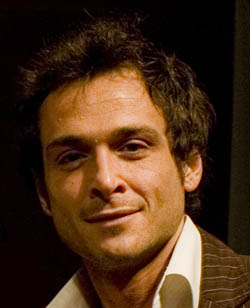Professor Ennio Tasciotti
Ennio Tasciotti, Ph.D. is Interim Co-chair, Regenerative Medicine; Scientific Director, Spine Advanced Technology Lab; Research Scientist, Department of Nanomedicine; and The Methodist Hospital Research Institute Principal Investigator.
Despite extraordinary progress in the laboratory, cancer mortality has not been reduced by any significant amount in the last fifty years. The main reasons are that “cancer” is actually several hundreds of disease, which differ dramatically in terms of their biology, and respond very differently to drugs.
Ennio’s research program focuses on: 1) the application of nanoporous silica chip technology to the early detection of diseases and the real time assessment of therapeutic efficacy, 2) the development of novel materials for enhanced polymeric scaffold reinforcement; 3) synthesis and functionalization of theranostic nanoparticles for targeted cancer drug delivery and imaging; 4) the modulation of the functions and properties of materials that promote cell survival and differentiation in tissue engineering; 5) the creation of unconventional multistage, multifunctional delivery vectors inspired by nature; 6) the understanding of the basic mechanisms of reaction of the cell to the exposure to and integration of nanoparticulates.
He coauthored Novel human-derived cell-penetrating peptides for specific subcellular delivery of therapeutic biomolecules, Transcellular transfer of active HSV-1 thymidine kinase mediated by an 11-amino-acid peptide from HIV-1 Tat, Mesoporous silicon particles as a multistage delivery system for imaging and therapeutic applications, In Vivo Imaging Shows Abnormal Function of Vascular Endothelial Growth Factor-Induced Vasculature, Fusion of the Human Immunodeficiency Virus Type 1 Tat Protein Transduction Domain to Thymidine Kinase Increases Bystander Effect and Induces Enhanced Tumor Killing In Vivo, and Nanotechnology for breast cancer therapy. His patent applications include Multistage Delivery of Active Agents.
Ennio earned his MSc in Biological Sciences at the University of Pisa, Italy in 2000. He earned his MSc in Molecular Biology at Scuola Normale Superiore Pisa, Italy, 2000. He earned his Ph.D. in Molecular Medicine at Scuola Normale Superiore Pisa, Italy, in 2005. He did his Postdoc work at the International Centre for Genetic Engineering and Biotechnology (ICGEB), Trieste, Italy and at the University of Texas Health Science Center at Houston, Houston, Texas.
Read UTHouston Nano Pioneer Test-Launching Multistage Drug Delivery System, Fracture Putty Could Save you an Arm and a Leg, and Nanomedicine System Engineered To Enhance Therapeutic Effects of Injectable Drugs.
